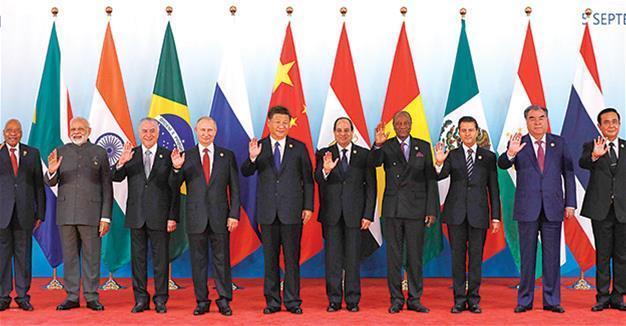China urges resistance to protectionism
XIAMEN, China

Chinese President Xi Jinping told an international summit on Sept. 5 that although the global economy had improved, risk factors had also increased.
Addressing the “Dialogue of Emerging Market and Developing Countries,” Xi appeared to rebuke the United States’s recent resistance to international agreements - including the Paris climate accord.
His remarks came after the BRIC nations - Brazil, Russia, India, China and South Africa- pledged in a joint declaration in the southeastern Chinese city of Xiamen to oppose to protectionism, a theme increasingly taken up by Xi as anti-globalization sentiment in the West poses a threat to China’s vast export markets.
In the 43-page declaration, Xi, Indian Prime Minister Narendra Modi, Russian President Vladimir Putin, Brazilian President Michel Temer and South African President Jacob Zuma said they would work together to improve global economic governance to foster “a more just and equitable international order.”
Xi said emerging and developing markets had been the primary engine of global growth and that such countries needed to work closely to build an open world economy.
“Recently, the world economy has taken a turn for the better. International trade and investment has picked up,” Xi said. “At the same time, we must take note that risk and uncertainty in the world economy are also increasing.”
China used the meeting of the BRICS countries and other developing economies to stress the need to promote trade liberalization and an open world economy.
The summit has also given China, the host, its latest chance to position itself as a bulwark of globalization in the face of U.S. President Donald Trump’s “America First” agenda.
“Multilateral trade negotiations make progress only with great difficulty and the implementation of the Paris Agreement has met with resistance,” Xi said.
“Some countries have become more inward-looking, and their desire to participate in global development cooperation has decreased.”
President Trump has called for improved terms for the United States in ongoing North American Free Trade Agreement (NAFTA) negotiations under threat of leaving the pact, and has said he will withdraw his country from the Paris climate accord.
Xi said on Sept. 5 that China will contribute $500 million for a South-South cooperation assistance fund to help other developing countries deal with famine, refugees, climate change and public health challenges.
The BRICS leaders are joined by observer nations Thailand, Mexico, Egypt, Guinea and Tajikistan, and officials will discuss a “BRICS Plus” plan to possibly expand the bloc to new members.
Xi said developed nations needed to provide more assistance to developing countries, while the BRICS nations and their developing country partners should oppose protectionism.
 Chinese President Xi Jinping told an international summit on Sept. 5 that although the global economy had improved, risk factors had also increased.
Chinese President Xi Jinping told an international summit on Sept. 5 that although the global economy had improved, risk factors had also increased.